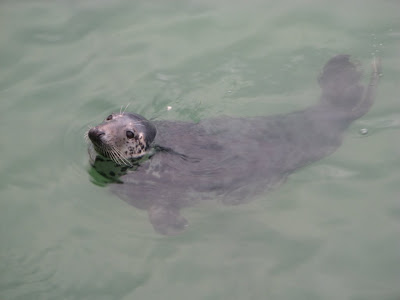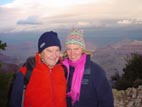Today we are near St Ives and there is driving rain and gales so we are catching up on all sorts of activities - emails, postcards, mending, laundry, shoe cleaning and of course blogging. In spite of the weather we have managed to do all the things we had planned and mostly kept fairly dry. These photos will give you an idea of the past week.
One rainy day last week we went to the Eden Project - http://www.edenproject.com/. Less than 10 years ago this charity acquired a disused china clay pit and has turned it into a wonderful garden which is used for education and research. It is amazing.
 These domes cover 13 hectares - the size of over 30 football pitches and house a range of different climate zones. It is just faabuous and has inspired me to do a whole lot more on the eco front when I get home - both at home and at church. I worked with a little group at church a year ago and we had all the light bulbs changed, bought GreenPower etc but I now have a lot of new ideas.
These domes cover 13 hectares - the size of over 30 football pitches and house a range of different climate zones. It is just faabuous and has inspired me to do a whole lot more on the eco front when I get home - both at home and at church. I worked with a little group at church a year ago and we had all the light bulbs changed, bought GreenPower etc but I now have a lot of new ideas. Part of the vege gardens - a lot of the restaurant food comes from here and from other local growers.
Part of the vege gardens - a lot of the restaurant food comes from here and from other local growers.There are heaps of little examples of good eco practice as you visit the gardens. I've taken heaps of photos to remind me when I get home and will check out their websites to see which ones might be useful.



In the tropical rainforest dome is this house from Malaysia

And a Mediterranean dome

Another day we went to Glendurgan gardens - spot the lady with the brollie in the maze and you know it's raining

Just nearby is the lovely National Trust house, Boscoe, where Phil and Peggy had a great holiday with Tim and Lyndall back in the early 90s.
 Portscatho
Portscatho
Yesterday was fine and sunny so we made the most of it - St Michael's Mount in the morning -

(We went over on the ferry at high tide when the causeway was under water then walked back after lunch.)
Lands End in the afternoon

When we arrived at St Ives about 7pm there was a lovely golden beach -
but 2 hours later when the tide came in it had all but disappeared
 We watched the fishing boats bringing in their catch and were fascinated by the 4 seals which followed them in.
We watched the fishing boats bringing in their catch and were fascinated by the 4 seals which followed them in.
From Phil:
Cornwall on a wet day – Wednesday 9 July.
I’m sure we shouldn’t complain about the weather as we are only here for two weeks and so far this is the only day completely dominated by rain. On the other frequent occasions when we have had some rain we have always managed to get out for some of the day – but not this time. Now we know why the fields are so lush and green. Enough about the weather.
Cornwall really is a place of contrasts. There are deserted beaches where the only access is by foot after a long walk and a sharp descent down a cliff-side. There are small villages where access is so difficult that they remain untouched by change. There are many sections of the South-West Coast Path (which runs in total for 630 miles) where it is rare to meet another person .Other beaches, villages/towns, sections of the Path are crowded with people who are taking their holidays but seem mostly to do so in a few popular places. The county has lost much of its ancient means of employment and production: the tin mines operate no more and the remnant buildings/ chimneys are tourist sites only. The fishing industry which employed so many families in the past is now becoming dominated by large firms with boats that can travel further but employ fewer people. Smuggling was a flourishing industry in the past as luxury goods were brought into deserted coves by small boats but mass travel overseas takes up that market. In spite of the changes, Cornwall for us remains a delightful place, where the rain which is so frequent is also the source of so much beauty and the crowds who throng particular places are content to leave in isolation miles of pathways, innumerable beaches and quiet villages. So today while we can’t get out actively we can look forward to places still to see and reminisce about the many lovely places already in our memories.







